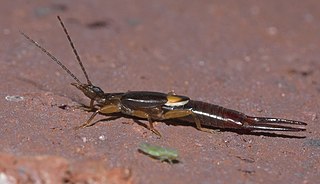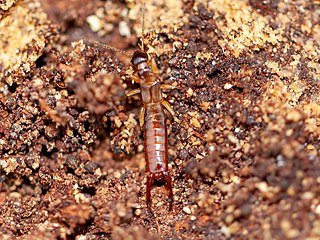
Earwigs make up the insect order Dermaptera. With about 2,000 species in 12 families, they are one of the smaller insect orders. Earwigs have characteristic cerci, a pair of forcep-like pincers on their abdomen, and membranous wings folded underneath short, rarely used forewings, hence the scientific order name, "skin wings". Some groups are tiny parasites on mammals and lack the typical pincers. Earwigs are found on all continents except Antarctica.

Forficula auricularia is a species complex comprising the common earwig or European earwig, an omnivorous insect in the family Forficulidae. The European earwig survives in a variety of environments and is a common household insect in North America. The name earwig comes from the appearance of the hindwings, which are unique and distinctive among insects, and resemble a human ear when unfolded; the species name of the common earwig, auricularia, is a specific reference to this feature. They are considered a household pest because of their tendency to invade crevices in homes and consume pantry foods, and may act either as a pest or as a beneficial species depending on the circumstances.

Forficulidae is a family of earwigs in the order Dermaptera. There are more than 70 genera and 490 described species in Forficulidae.

Arixeniidae is a family of earwigs in the suborder Neodermaptera. Arixeniidae was formerly considered a suborder, Arixeniina, but was reduced in rank to family and included in the new suborder Neodermaptera.

Hemimeridae is a family of earwigs in the suborder Neodermaptera. Hemimeridae was formerly considered a suborder, Hemimerina, but was reduced in rank to family and included in the new suborder Neodermaptera.

Chelisochidae is a family of earwigs whose members are commonly known as black earwigs. The family contains a total of approximately 96 species, spread across sixteen genera in three subfamilies.

Labiduridae, whose members are known commonly as striped earwigs, is a relatively large family of earwigs in the suborder Neodermaptera.

Labia minor, the lesser earwig or small earwig, is a species of earwig. It is widespread globally in temperate climates, preferring warm locations such as compost heaps in parts of its range. It is 4–7 mm long, including the pincer, and chocolate brown in color.

Spongiphoridae is a family of earwigs in the suborder Neodermaptera. There are more than 40 genera and 510 described species in Spongiphoridae.

Doru taeniatum, the lined earwig, is a species of earwig in the family Forficulidae. It is found in Central America, North America, and South America.

Vostox brunneipennis is a species of earwig in the family Spongiphoridae. It is found throughout the Americas.

Vostox is a genus of earwigs in the family Spongiphoridae, found in the Americas. There are more than 20 described species in Vostox.

Marava arachidis is a species of earwig in the family Spongiphoridae. It is found in Africa, Australia, the Caribbean, Europe, Northern Asia, North America, South America, and Southern Asia. It inhabits the stems of fennel and females will lay eggs on fennel leaves.

Marava is a genus of earwigs in the family Spongiphoridae; most records are from the Americas, but M. arachidis is cosmopolitan. There are more than 50 described species in Marava.

Marava pulchella is a species of earwig in the family Spongiphoridae. It is found in the Caribbean and North America.

Neodermaptera, sometimes called Catadermaptera, is a suborder of earwigs in the order Dermaptera. There are more than 2,000 described species in Neodermaptera.

Anechurinae is a subfamily of earwigs in the family Forficulidae. There are more than 70 described species in Anechurinae.
Neolobophorinae is a subfamily of earwigs in the family Forficulidae. There are about 5 genera and 19 described species in Neolobophorinae.
Semenoviolidae is an extinct family of earwigs in the order Dermaptera. There are at least two genera and two described species in Semenoviolidae.

The Spongiphorinae are a medium-sized subfamily of earwigs in the superfamily Forficuloidea, sometimes called "little earwigs", erected by Karl Wilhelm Verhoeff in 1902. Distribution records appear to be incomplete, but genera such as Spongiphora originate from the Americas including the Caribbean; certain species such as Marava arachidis, have a cosmopolitan distribution.















